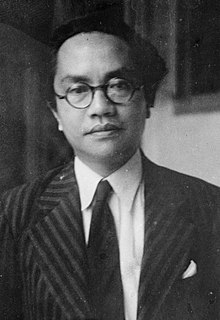Syarifuddin
|
Mr. Amir Sjarifoeddin |
|
|---|---|
 |
|
| 2nd Prime Minister of Indonesia | |
|
In office 3 July 1947 – 29 January 1948 |
|
| President | Sukarno |
| Preceded by | Sutan Sjahrir |
| Succeeded by | Mohammad Hatta |
| 3rd Minister of Defence of the Republic of Indonesia | |
|
In office 14 November 1945 – 29 January 1948 |
|
| President | Sukarno |
| Preceded by | Imam Muhammad Suliyoadikusumo |
| Succeeded by | Mohammad Hatta |
| 1st Minister for Communications and Information of the Republic of Indonesia | |
|
In office 2 September 1945 – 12 March 1946 |
|
| President | Sukarno |
| Preceded by | Office created |
| Succeeded by | Muhammad Natsir |
| Personal details | |
| Born |
Amir Syarifuddin Harahap 27 April 1907 Medan, North Sumatra, Dutch East Indies |
| Died | 19 December 1948 (aged 41) Soerakarta, Central Java, Indonesia |
| Cause of death | Execution by shooting |
| Nationality | Indonesia |
| Political party |
Socialist Party Communist Party of Indonesia |
| Profession | Politician |
Amir Sjarifuddin Harahap, also spelled Amir Sjarifoeddin Harahap (27 April 1907 – 19 December 1948) was a socialist politician and one of the Indonesian Republic's first leaders, becoming Prime Minister during the country's National Revolution. A Christian convert from a Muslim Batak family, Amir was a major leader of the Left during the Revolution. He was executed in 1948 by Indonesian Republican officers following his involvement in a Communist revolt.
Born into Sumatran aristocracy in the city of Medan, Amir's wealthy background and outstanding intellectual abilities allowed him to enter the most elite schools; he was educated in Haarlem and Leiden in the Netherlands before gaining a law degree in Batavia (now Jakarta). During his time in the Netherlands he studied Eastern and Western philosophy under the tutelage of the Theosophical Society. Amir converted from Islam to Christianity in 1931. There is evidence of sermons he gave in the largest Protestant church in Batak Batavia.
In the early 1930s, Amir was active in literary and journalist circles, joining the editorial board of the newspaper Panorama, together with Liem Koen Hian, Sanusi Pane and Mohammad Yamin. In mid-1936, together with his colleagues Liem, Pane and Yamin, Amir started another newspaper, Kebangoenan (1936–1941), which—as with Panorama—was published by Phoa Liong Gie's Siang Po Printing Press.
In 1937, towards the end of the Dutch period, Amir led a group of younger Marxists in the establishment of Gerindo ('Indonesian People's Movement'), a radical co-operating party opposed to international fascism as its primary enemy. The Soviet Union’s Dmitrov doctrine had called for a common front against fascism which helped swell the number of Indonesians taking a cooperative approach with regards to the Dutch colonial administration in an attempt to secure Indonesian independence. Gerindo was one of the more significant cooperative parties in the years leading to World War II whose objectives included a fully Indonesian legislature; It had modest goals in comparison to the Dutch-suppressed radical nationalists led by the likes of Sukarno and Hatta, who Sjarifuddin had met before the War. By 1940, Dutch intelligence suspected him of being involved with the Communist underground.
...
Wikipedia
